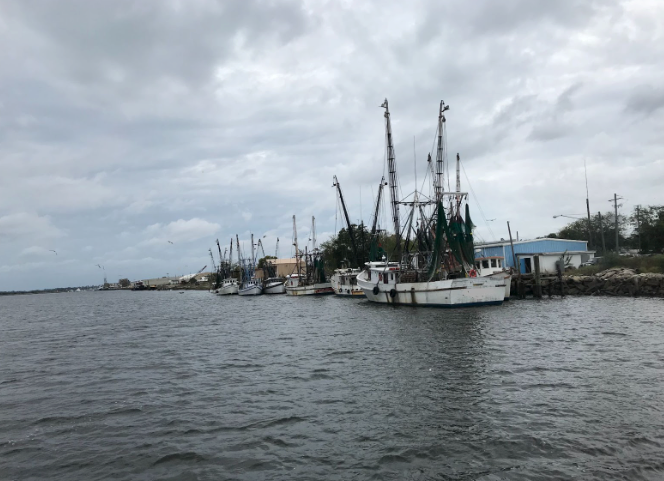A grant of more than $254,000 awarded to Georgia Southern University will provide the first comprehensive assessment of Georgia’s working waterfronts since 1975. Although location data on docks was gathered by Georgia Southern researchers between 2018-21 through a Georgia Sea Grant project, there is no in-depth information on the current conditions of each dock and its infrastructure, according to Jennifer Sweeney Tookes, Ph.D., a Georgia Southern associate anthropology professor.
The new grant funds a three-year project in which a group of three to five students each year will receive intensive training in qualitative research methods, as well as the complexities associated with managing Georgia’s coast, and commercial fishing industry. It covers the students’ research travel to spend multiple days and nights on the coast to conduct interviews for “Dock Stories,” a collaborative effort with the University of Georgia’s Bryan Fluech. Sweeney Tookes is the primary investigator for “Dock Stories,” a project that addresses specific needs identified by Department of Natural Resources Coastal Resources Division (GADNR-CRD), aiming to develop a tool for allocating funding beyond direct payments to the commercial fishing industry. This updated research can assist GADNR-CRD in identifying and prioritizing crucial repairs and enhancements essential for sustaining Georgia’s commercial fishing industry in the future.
“This data from participants will simultaneously document past experiences centered around the cultural history and heritage of the docks, and the best paths forward to increase their future resilience to disruptive events such as storms, rising coastlines, and increasing temperatures,” Sweeney Tookes said. “I am excited to be a part of the ongoing commitment to supporting the commercial fishing industry and appreciate the flexibility they [GADNR-CRD] allowed me in crafting this complex project that addresses their goals and needs, supports commercial fishers, includes student researchers, and looks for new and innovative ways to increase the future resilience of commercial fishing in Georgia.”
Sweeney Tookes shared that as part of the process, students will record oral history interviews that will be analyzed for both public and academic publications and presentations, in addition to being housed in the Voices Oral History Archives to provide living history and cultural heritage for the general public to experience and appreciate. Interviews from Tooke’s two previous student research projects can be found under “Fishing Traditions & Fishing Futures” and “Boat Stories.”
Kristin Meeuwen, project manager for “Dock Stories,” explained how the grant will impact her as both a student and manager.
“As a graduate student whose assistantship is funded by this grant, I am extremely grateful Dr. Sweeney Tookes chose me,” Meeuwen said. “She is a force in the anthropological community, and to learn from her and help compile data is going to be not only fun but also beneficial project management and data analysis experience. I am excited to do this work because it removes me from my emphasis on archaeology and allows me to use the cultural research methods I have in my anthropological toolkit.”
Sweeney Tookes describes herself as a teacher-scholar and says her overarching goal is to successfully integrate her research and scholarship with teaching and service.
“As an applied anthropologist, I value addressing human problems utilizing the methods and theories of anthropology, educational outreach to the communities with whom I work and training the next generation of applied social scientists by including them in my research,” the professor said. “I am grateful for the opportunity to combine all these goals into one project, thanks to the insight and support of the Georgia Department of Natural Resources Coastal Resources Division.”
The grant will fund a full-time graduate student in the social sciences program and plans to hire an undergraduate research assistant to assist with logistical project support and data collection. The opportunities not only help them develop marketable, career-ready skills but also address real-life needs in coastal Georgia. The work is expected to start in January 2024 and conclude in July 2027.




